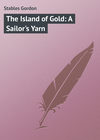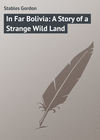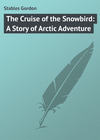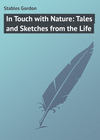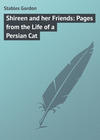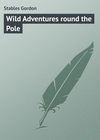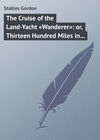Kitabı oku: «The Island of Gold: A Sailor's Yarn», sayfa 12
“But,” he added, “it was generally with the natives of those islands from which we had already obtained volunteers that we had the greatest trouble. The ship I used to sail in, Tandy, was as honest as it is possible for such a ship to be, and I never saw natives ill-treated by any of our crew, though more than once we had to fight in self-defence. The reason was this. Many ships that had agreed to bring the blacks back home, broke their promise, which, perhaps, they had never intended to keep. When they returned to the islands, therefore, to obtain more recruits, bloodshed was almost certain to ensue. If one white man was killed, then the revenge taken was fearful. At a safe distance the whites would bring their rifles and guns to bear upon the poor savages, and the slaughter would be too dreadful to contemplate. If the unhappy wretches took shelter in their woods or jungles, these would be set on fire, till at last a hundred or more of them would fling their arms away, hold up the palms of their hands in token of submission, or as on appeal for mercy, and huddle together in a corner like fowls, and just as helpless. The whites could then pick and choose volunteers as they pleased, and it is needless to tell you there was nothing given in exchange.
“Our trouble took place when we returned to an island, having found it impossible to bring the natives we had taken off back with us. This they looked upon as cheating, and they would rush to arms, compelling us to fire upon them in self-defence.
“Well, we were constantly on the search for new islands. The natives on these might threaten us for a time, but the ‘call-crows’ soon pacified them. The beads and presents we distributed, coupled with the glowing accounts of life in Queensland which the ‘crows’ gave these poor heathen, did all the rest, and we soon had a cargo.”
“And this species of trade was, or is, called black-birding, I think,” said Tandy.
“It was, and is now, sub rosa.
“But I was going to tell you of a volcanic eruption. Before I do so, however, I propose that we order the main-brace to be spliced. For this is an auspicious night, you know, and I have not heard a jovial song on board the Sea Flower for many and many a day.
“Janeira!”
“Yes, sah. I’se not fah away, sah.”
And Janeira entered, smiling as usual, and as daintily dressed as a stage waiting-maid.
“Pass the word for Fitz, Janeira, like a good girl.”
“Oh, he’s neah too, sah. At you’ service, sah!”
Fitz had been in the pantry eating plum-duff, or whatever else came handy. The pantry was a favourite resort with Lord Fitzmantle, and Janeira never failed to put after-dinner tit-bits away in a corner for his especial delectation.
“Now, Jane, you shall draw some rum, and, Fitz, you must take it for’ard. Here is the key, Jane; and, Fitz, just tell them for’ard to drink the healths of those aft, and sing as much as they choose to-night.”
“Far away then, Tandy and Nelda,” said Halcott, resuming his narrative, “to the west of this island, farther away almost than the imagination can grasp, so solitary and wide is this great ocean, there used to be a small island called Saint Queeba. Who first found it out, or named it, I cannot tell you, Tandy, but I believe our own brig was the first that ever visited it in a black-birding expedition.
“The population seemed to be about three thousand, and of these we took away at least one hundred and fifty. The poor creatures appeared to have no fear of white men, and so we concealed our revolvers and entered into friendly intercourse with them.
“The island was a long way from any other, and this probably accounted for its never having been black-birded before.
“We returned from Australia almost immediately again after landing our recruits, and I for one felt sure the natives would welcome us.
“So we brought extra-showy cloth and the brightest beads we could procure.
“They did welcome us, and we soon had about half a cargo of real volunteers.
“We were only waiting for others to come from the interior; for the wind was fair just then, and we were all anxious to proceed to sea.
“The very evening before the arrival of the blacks, however, the wind went suddenly down, although, strangely enough, at a great altitude we could see scores of small black clouds scurrying across the sky. Finally, some of these circled round and round, and combined to form a dark blue canopy that gradually lowered itself towards the island.
“Soon the sun went down, a blood-red ball in the west, and darkness quickly followed. It was just then that we observed a fitful gleam arise from the one and only mountain the island possessed. Over this a ball of cloud had hung all day long, but we had taken little notice of it.
“‘I’ve never seen the like of that before, mate,’ said the skipper to me, pointing at the slowly descending pall of cumulus.
“‘Nor I either, captain,’ I replied.
“I couldn’t keep my eyes off it, do what I would, for dark though the night was that strange cloud was darker. It seemed now to be sending downwards from its centre a whirling tail, or pillar, which the gleams that began to rise higher and higher from the developing volcano lit up, and tongues of fire appeared to touch.
“‘It’s going to be a storm of some kind, Halcott,’ said my skipper. ‘Oh, for a puff of wind, for, Heaven help us, lad! we are far too near the shore.’
“‘I have it,’ he cried next minute. ‘Lower the boats and heave up the anchor.’
“I never saw men work more willingly in my life before. Even the blacks we had on board lent a hand, and no sooner was the anchor apeak than away went the boats, and the ship moved slowly out to sea.
“We had got about three knots off-shore, when, happening to look back, I saw a sight which I shall remember to my dying day.
“The black and awful whirling cloud had burst. If one ton of water came down like an avalanche, a million must have fallen, with a deafening roar like a thousand thunders.
“It seemed as if heaven and earth had gone to war and the first terrific shot had been fired.
“For a time the mountain was entirely enveloped in darkness; then up through this blackness rose high, high into the air a huge pillar of steam. This continued to rise for over an hour, with incessant thunder and lightning around the base of the hill. Rain, almost boiling hot, fell on our decks, and hissed and spluttered on the still water around the ship, compelling us to fly below or seek the shelter of tarpaulins.
“This ceased at last, and now we could see that the volcanic fire had gained the mastery; for the flames, with huge pieces of stones and rocks, were hurled five hundred feet at least into the starry sky.
“For many hours the thunderings and the lightnings over that devoted island and around the hill were such, Tandy, as I pray God I may never see or hear again. There were earthquakes, too; that was evident enough from the strange commotion in the water around us, and this was communicated to the ship. The best sailors on our brig could scarcely stand, far less walk. Towards morning it had partially cleared, although the lightning still continued to play, fork and sheet, above the base of the volcanic hill. We could now see streams of molten lava pouring down the mountain’s side, green, crimson, and violet.
“Very lovely indeed they were. But ah! then I knew the fate of those unhappy inhabitants was to be a terrible one. It would be a choice of deaths, for in less than half an hour the isle was one vast conflagration. We saw but little more of it even next day, for the lava was now pouring into the sea and a cloud of steam enveloped the scene of tragedy.
“Our decks were covered with dust and scoriae, and this fell steadily all that day.
“We had managed by means of the boats to work off and away fully fifteen miles. This was undoubtedly our salvation; for presently we were struck by a terrible tornado, and it required all our skill to keep out of the vortex.
“While it was still raging around us, an explosion away on our port quarter, where the island would be just then, seemed to rend the whole earth in pieces. Many of our crew were struck deaf, and remained so for days. Our ship shook, Tandy, fore and aft, quivering like a dying rat. She seemed to have no more stability in her then than an old orange box.
“An immense wave, such as I had never seen before, rose in the sea and swept on towards us. The marvel is that it did not swamp us.
“As it was we were carried sky-high, and our masts cracked as if they were about to go by the board. Smaller waves followed, and the gale that brought up the rear drove us far away from the scene of the terrible tragedy before the sun rose, redder than ever I had seen it before, for it was shining through the dust and débris of that broken up island.
“I left the trade soon after this, Tandy. I was tired and sick of black-birding.
“But in my own ship, two years after this, I visited the spot. The island was gone; but for more than a mile in circumference the sea was strangely rippled, and gases were constantly escaping that we were glad enough to work to windward of.
“But listen! our good little crew is singing. Well, there is something like hope in that – and in the sweet notes of Tom Wilson’s violin. He’s a good man that, Tandy, but he has a history, else I’m a Hottentot.
“Well, just one look at the sky, and then I’ll turn in, my friend. We don’t know what may be in store for us to-morrow.”
And away up the companion-way went Captain Halcott.
Book Three – Chapter Two.
“I See a Beach of Coral Sand, Dark Figures Moving to and fro.”
Next morning broke bright and fair. Not a cloud in all the heaven’s blue; not a ripple on the water, just a gentle swell that broke in long lines of snow-white foam on the crescent shore – a gentle swell with sea-birds afloat on it. Ah! what would the ocean be to a sailor were there no birds. The sea-gulls are the last to leave him, long after all other friends are gone, and the land, like a pale blue cloud far away on the horizon, is fading from his view.
“Adieu! adieu! away! away?” they shriek or sing, and as the shades of evening are merging into darkness they disappear. But these same birds are the first to welcome the mariner back, and even should there be no land in sight, or should clouds envelop it, the sight of a single gull flying tack and half-tack around the ship sends a thrill of hope and joy to the sailor’s heart. On the deep, lone sea, too, Jack has ay a friend, should it be but in the stormy petrel, the frigate-bird, or that marvellous eagle of the ocean, the albatross itself.
Those birds floating here around the Sea Flower so quietly on the swell of the sea looked as happy as they were pure and lovely. No whiteness, hardly even snow itself, could rival the whiteness of their chests, while under them their pink legs and feet looked like little twigs of coral.
The morning was warm, the sun was bright; they were moving gently with the tide, careless, happy. As he stood there gazing seawards and astern – for the ship had swung to the outgoing tide – Halcott could not help envying them.
“Ah!” he said half aloud, “you are at home, sweet birds; never a care to look forward to, contentment in your breasts, beauty all around you.”
Then his thoughts went somehow wandering homewards to his beautiful house, his house with a tower to it, and his lovely gardens. They would not be neglected though. It was autumn here. It would be spring time in England, with its buds, its tender green leaves, its early flowers, and its music of birds. Then he thought of his dog. Fain would he have brought him to sea. The honest collie had placed his muzzle in his master’s hand on that last sad evening of parting, and glanced with loving, pleading eyes up into his face.
“Take me,” he seemed to say, “and take her.”
Her was Doris. His – Halcott’s – own Doris; the lovely girl for whom he had risked so much, for whom he would lay down his life; the girl that would be his own fair bride, he told himself, if ever he returned. Ah! those weary “ifs!”
But he had looked into the dog’s bonnie brown eyes.
“Friend,” he had said, “you will stay with Doris. You will never leave her side till I come back. You will watch her for me.”
And he remembered now how Doris had at that moment thrown herself into his arms, and strained him to her breast in a fit of convulsive weeping.
And this had been the parting.
“What, Halcott,” cried Tandy’s cheerful voice, “up already! and – and – why, Halcott, old man, there is moisture in your eyes!”
“I – I was thinking of home, and – well, I was thinking of my dog.”
“And your Doris. Heigho! I have no Doris, no beautiful face to welcome me home. But look yonder,” he added, taking Halcott’s arm.
Little Nelda stood at the top of the companion-way, the sunlight playing on her yellow hair, one hand held up to screen her face, delicate, pink, yet so shyly sweet, and her blue eyes brimful of happiness.
Just one look she gave, then, with arms outstretched, rushed gleefully towards her father. Next moment she was poised upon his shoulder, and Tandy had forgotten that there was any such thing as danger or sorrow in the world.
The two men walked and talked together now for quite an hour. Indeed, there was very much to talk about, for although they had made the island at last, they had no idea as yet how they should set about looking for the gold which they were certain existed there.
They had not made up their minds as to what they should do, when Janeira rang the bell for breakfast, and with Fitz was seen staggering aft with the covered dish.
“Jane, you look happier than ever this morning. What is the matter? Has some beautiful bird brought you a letter from home?”
“De bootiful bird, sah, is Lawd Fitzmantle, and see, sah, dat is de letter from home.”
She lifted the dish cover as she spoke. Beautiful broiled fish caught only that morning over the stern, but oh, the delicious odour would have revived the heart of a dying epicure!
“Babs is going to be very good to-day,” said Tandy to his little daughter after breakfast.
“Better than ever, daddy?”
“Yes, much, because I’m going on shore with Captain Halcott here and two men.”
“And me?”
“No, not to-day, dear. We’re going to climb that high hill and look all round us, and perhaps put up a flag; and Ransey will let you look through a spyglass to see us, and we’ll wave our hands to you. Now will you be better than usual?”
“Ye-es, I think I’ll try. And oh, I’ll make the Admiral look through the spyglass too, and when you see him looking through, you must wave your hand and fire your gun. Then we’ll all – all be happy and nicer than anything in the whole world.”
It was not without a feeling of misgiving that Halcott and Tandy left the boat that had taken them on shore, and took their way cautiously towards the bush. There was hard work before them and the two sturdy fellows, Chips and Tom Wilson, whom they had brought with them – hard work to penetrate through the jungle and to effect an ascent of the hill they had already named the Observatory – hard work and danger combined.
The crew of the boat stood gun in hand until they saw the party safe into the bush, then, more easy in their minds now, rowed slowly back to the ship. For if savages had been hiding under cover, the attack would have been made just as the party was stepping on shore.
The exploring party kept to the extreme edge of the bush after penetrating and searching hither and thither for a time, but neither track nor trail of savages could they find. But they came across several little pathways that led here and there through the jungle, and at first they could not make out what these were. They learned before long, however; for Bob, who had gone on ahead a little way, came suddenly and excitedly rushing out from a thicket. In his mouth he held something that Tandy imagined was a rat, but the shrieking and yelling behind the dog soon undeceived him, and, lo! there now rushed into the open a beautiful little boar and a sow. The former flashed his tusks in the sunlight. He wanted the baby back. It was his, his, he said, and his wife’s. He felt full of fight, and big enough to wage war against the whole world for that baby.
Tandy made Bob drop it, which he did, and it ran squealing back to its mother. The boar, or king pig, said he accepted the apology, and would now withdraw his forces. And he accordingly did so by scuttling off again into the bush. These wild dwarf-pigs and a species of rock-rabbit were, they found afterwards, about the only animals of any size the island contained.
After this trifling adventure they fought their way through a terrible entanglement of bush, till they reached the foot of the hill.
The men had brought saws and axes with them, and were thus enabled by cutting here and whacking there to make a tolerably good road. When they reached the hill they found themselves in a woodland of beautiful trees. Walking was now easy enough, and in about an hour’s time they reached the summit of the hill and sat down to luncheon.
Eager eyes were watching their progress from the ship, for the upper part of this mount was covered only with stunted grass and beautiful heaths, among which they noticed many a charmingly-coloured lizard – green with crimson markings, or pale blue and orange – but they saw no snakes.
Tandy turned his glass now upon the barque, and there sure enough was Nelda with the Admiral by her side. He waved his coat, and twice he fired his gun. From the hill on which they stood the view was lovely beyond compare. They could see well into the highland part of the island, with its rolling woods, on which the fingers of autumn had already traced beauty tints; its bosky glens; its rugged rocks and hills; its streaks of silvery streams; the lake lying down yonder in the hollow, with something like a floating garden in its centre; and afar off the vast expanse of ocean.
Look which way they would, that sea was all before them, only dotted here and there far to the northward with islands much smaller than the one on which they stood.
High up on the top of the volcanic hill a white cloud was resting, and its dark sides were seamed with many a waving line, the channels down which lava must have run during some recent eruption.
“Ha!” said Halcott presently, “now I can understand the mystery of the burned forest. At first, when we landed here, we believed that the black-birders had been ahead of us; but no, Tandy, no, it was nothing but the lava that fired the forest.”
But strangely enough, however, not a sign of human life was anywhere visible.
Was there any way of accounting for this? “What is your theory, Halcott?” said Tandy. Halcott was lying on the green turf, fanning himself with his broad hat.
But he now lit his pipe. Like most sailors, he was capable of calmer and more concentrated thought when smoking.
“Tandy,” he said slowly, after a few whiffs of the too seductive weed – “Tandy, we have luck on our side. Those blackamoors have fled helter-skelter at the first signs of the eruption. Nothing in the world strikes greater terror to the mind of the ordinary savage – and precious ordinary most of them are – than a sudden convulsion of nature.”
Another whiff or two.
“What think you, men,” he said, looking round him, “came up with the fire and the smoke from the throat of that volcanic hill?”
“Stones and ashes,” ventured Chips.
“Stones and ashes? Yes, no doubt, but demons as well – so the dusky rascals who inhabited this island would believe – demons with fire-fierce eyes, tusks for teeth, and blood-red lolling tongues; only the kind of demons that at home nurses try to frighten children with, but more dreadful to those natives than either falling stones or boiling rain.
“That is it, Tandy; they have fled. Heaven grant they may not come back. But if they do, we must try to give them a warm reception, unless they are extra civil. Meanwhile, I think that old Vulcan, at his forge in yonder hill, has not let out his fires. They are merely banked, and he is ready to get up steam at a moment’s notice.
“Why, Tandy, what see you?”
The mate of the Sea Flower was lying flat on the green hill-top, with his telescope resting on Bob’s back.
“I see – I – see,” he said, without taking his eye from the glass, “a little island far away, a level island it is.”
“Yes. Go on.”
“I see a beach of coral sand, dark canoes like tree-trunks are lying here and there, and I see dark figures moving to and fro, and many more around a fire. The beach is banked behind by waving plantain or banana-trees, and cocoa palms are nodding in the air.”
“Then,” said Halcott, “I was right, and those savages you see, Tandy, are the natives of this Island of Gold – for we shall call it the Isle of Misfortune never again – the very natives, Tandy, who fled from this place when Vulcan’s thunders began to shake the earth.”
Slowly homewards now they took their way, and just as the sun was westering stood once more upon the coral beach. The boat was speedily sent for them, and they were not sorry to find themselves once more on board.
Fine weather continued, with scarcely ever a breath of wind, for a whole week. But this could not always be so. The ocean that stretches from the shores of South America far across to New Zealand and Australia is Pacific by name, but not always pacific by nature, and terrible indeed are the gales and circular storms that sometimes sweep over its surface.
So, knowing this, Halcott and Tandy determined to seek, if possible, a safer anchorage or harbour.
It was with this view that they extended their explorations, and made little boat excursions round the rocky coast. These last Nelda, much to her joy, was permitted to join. Looking over the boat’s gunwale, far down into the depths of the clear, transparent water, she could see marine gardens more lovely than any she had ever dreamt of.
“Oh,” she cried, “look, daddy, look! That is fairyland. Oh, I should like to go down and see a mermaids’ ball.”
After rounding the promontory, with its bold, bluff cliffs frowning darkly over the deep, they came to the entrance to the river.
This river was fed by springs that rose far inland, and so wide was it at its mouth that the mariners hoped it would make a most excellent shelter and harbour for the Sea Flower. Alas, greatly to their disappointment, they found it barred across.
And no other spot could be found around the island coast.
By paying out the anchors; however, which, getting a firm hold of the coralline bottom, were almost bound to hold, Halcott believed the Sea Flower could weather almost any storm.
In this he was sadly mistaken, as the sequel will show.
It was determined now to penetrate into the highland part of the isle itself, and make their first grand plunge for gold. If this could be found in sufficient quantities, their stay on the island need be but very brief.
